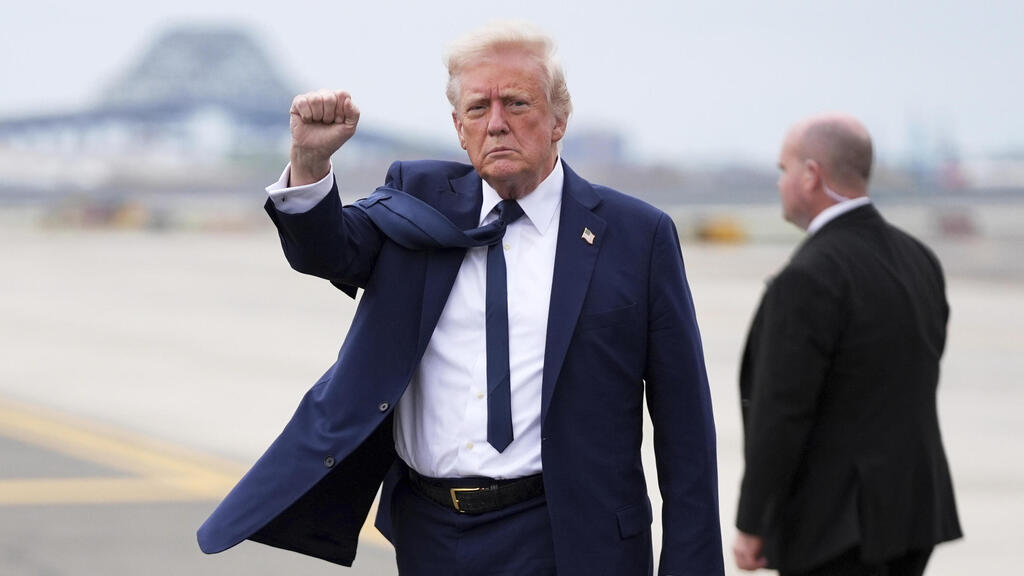According to insiders, when the U.S. presidential race was between Joe Biden and Donald Trump, Prime Minister Benjamin Netanyahu favored Biden, assuming the Democrat was strongly pro-Israel and that Netanyahu would know how to maneuver the system to serve Israeli interests.
But once Biden dropped out and Kamala Harris entered the picture, the situation became more complicated. Throughout, Israeli officials have been aware of the Republican Party’s staunch support, but Trump is no typical Republican. Above all, he is guided by the ideology of MAGA — Make America Great Again — a worldview shaped by risk management and maximizing U.S. interests.
Trump’s upcoming trip to the Middle East will focus on economic aspects, including major deals and investments aimed at strengthening long-term U.S. ties with Arab states. A visit to Israel is not currently planned, despite Israeli efforts — a signal, perhaps, of the new administration’s priorities. When President Obama began his first term, he visited Cairo and Istanbul but skipped Israel, a move widely seen as a poor start to bilateral relations.
Within the Republican Party, foreign policy is a divisive issue. On one side are traditional Republicans like Mike Waltz, strong supporters of Israel who back military action against Iran. On the other are neo-isolationists like Don Jr. (Trump’s son) and Vice President J.D. Vance, who oppose military entanglements, favor focusing on domestic issues, and lead a more isolationist line. For now, following Waltz’s removal as national security advisor, the latter camp seems to be gaining the upper hand. And while most of the officials appointed to top foreign and defense positions are nominally pro-Israel, Israel appears to be losing ground.
Donald Trump about the Houthis truce
The “America First” doctrine is not inherently anti-Israel, but it is unequivocally pro-American interest. When the U.S. began airstrikes in Yemen, Vice President Vance opposed the move, arguing it wasn’t America’s problem. Israel’s interests, in this view, are not central to U.S. calculations — a troubling reality, especially regarding Iran.
The U.S. is racing toward a new nuclear agreement and has openly discussed allowing Iran access to nuclear energy. Israel was notified about these negotiations only at the last minute and was stunned. Washington seemed to forget that Iran has deceived the world before, that it once plotted to assassinate Trump and then-Secretary of State Mike Pompeo, and that it remains the hub of the terror network it funds and directs. Israeli officials were also shocked when Trump revealed he had convinced Netanyahu not to attack Iran.
The 'America First' doctrine is not inherently anti-Israel, but it is unequivocally pro-American interest
Jerusalem’s frustration with Trump’s conduct is increasingly hard to conceal. When Trump decided to halt attacks on the Houthis, Israel wasn’t even updated — it found out from the news. That move, many felt, went too far. The message to the region was clear: Israel is no longer a top U.S. priority. If both the Houthis and the Iranians can strike deals with Washington behind Israel’s back, it sends a dangerous signal that Israel is fair game.
This shift is also visible in Syria, where the U.S. is preparing to withdraw its forces; in Trump’s cozying up to Turkey’s President Erdogan, who continues to issue antisemitic threats unchecked; and in revived discussions about selling F-35 fighter jets to Turkey. In Saudi Arabia, Trump is promoting massive economic deals. Normalization with Israel is no longer a central goal — perhaps because Trump knows Netanyahu isn’t rushing to end the war in Gaza or consider any formula hinting at a two-state solution, the bare minimum for Riyadh. Trump’s much-discussed Gaza relocation plan has also been shelved.
<< Get the Ynetnews app on your smartphone: Google Play: https://bit.ly/4eJ37pE | Apple App Store: https://bit.ly/3ZL7iNv >>
Has Trump abandoned Israel? It depends who you ask. Some argue he was never truly “with us.” Trump is not deeply committed to his own policies, which often shift, and Israeli officials are struggling to influence his decisions. If Biden had taken the steps Trump has in recent weeks, Netanyahu likely would have flown to Washington to address Congress. But now, his hands are tied — mostly because Trump is still perceived as the most pro-Israel president ever.
Israel must now grapple with how to remain relevant in the evolving American worldview. There are still those in Washington who genuinely care about Israel — including Senator Marco Rubio, businessman Steve Witkoff, and newly appointed U.S. Ambassador Mike Huckabee, who just made a historic official visit to ancient Shiloh and met with leaders of the Israeli settlement council. Israeli officials hope these allies can convince Trump to move in Israel’s favor on key issues.
Some in Israel prefer to focus on the silver lining. On the Houthi front, they argue, there’s been no abandonment: Trump made clear from day one that the Red Sea operation was only about restoring freedom of navigation, as agreed via Omani mediation. He never promised to act on Houthi missile fire at Israel and continues to support Israeli defense. As for Gaza emigration, the optimists in Jerusalem believe Trump’s vision still lives — it just depends on finding willing host countries. And the Iran talks? It's too soon to tell how they’ll end. But without negotiations, Trump would have no justification for military action. For now, Israel can only hope the talks fail — and that the military option returns to the table.






